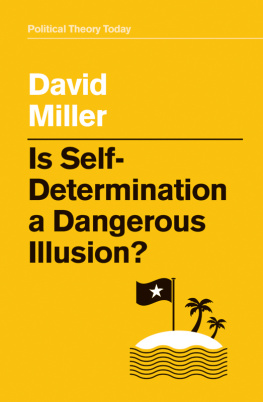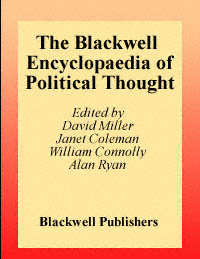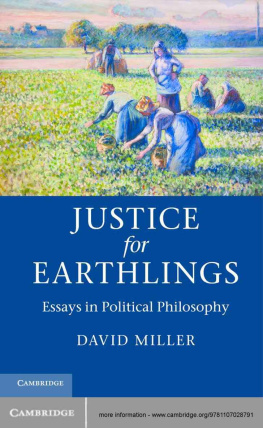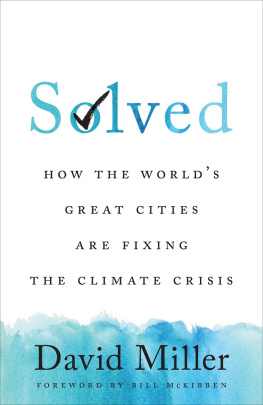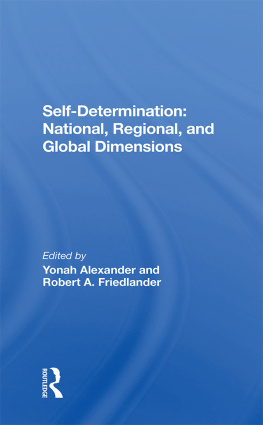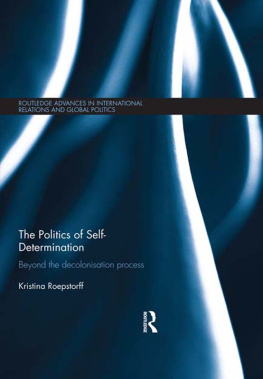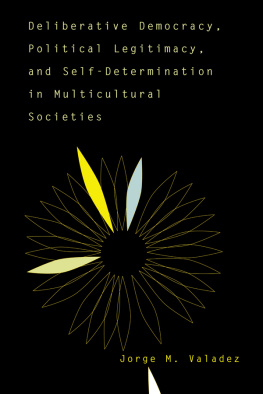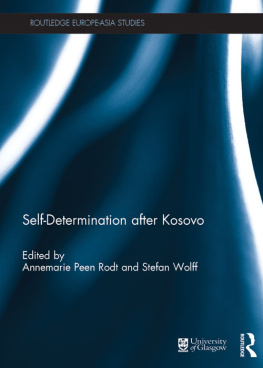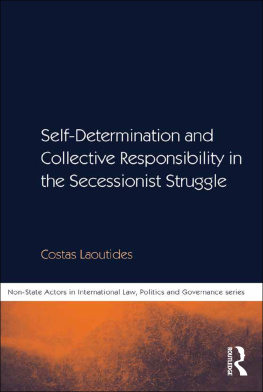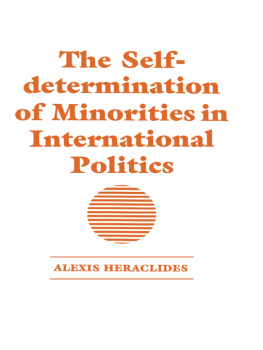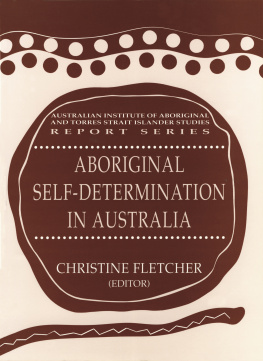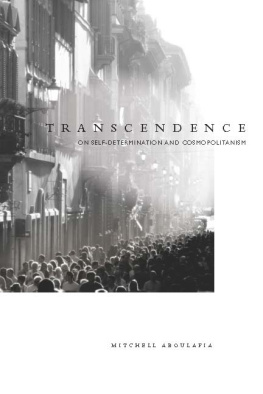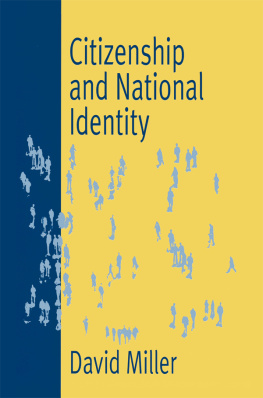
Series title
Political Theory Today
- Janna Thompson, Should Current Generations Make Reparations for Slavery?
- Chris Bertram, Do States Have the Right to Exclude Immigrants?
- Diana Coole, Should We Control World Population?
- Christopher Finlay, Is Just War Possible?
- George Klosko, Why Should We Obey the Law?
- Emanuela Ceva & Michele Bocchiola, Is Whistleblowing a Duty?
- Elizabeth Frazer & Kimberly Hutchings, Can Political Violence Ever Be Justified?
- Margaret Moore, Who Should Own Natural Resources?
- David Miller, Is Self-Determination a Dangerous Illusion?
Is Self-Determination a Dangerous Illusion?
David Miller
polity
Copyright page
Copyright David Miller 2020
The right of David Miller to be identified as Author of this Work has been asserted in accordance with the UK Copyright, Designs and Patents Act 1988.
First published in 2020 by Polity Press
Polity Press
65 Bridge Street
Cambridge CB2 1UR, UK
Polity Press
101 Station Landing
Suite 300
Medford, MA 02155, USA
All rights reserved. Except for the quotation of short passages for the purpose of criticism and review, no part of this publication may be reproduced, stored in a retrieval system or transmitted, in any form or by any means, electronic, mechanical, photocopying, recording or otherwise, without the prior permission of the publisher.
ISBN-13: 978-1-5095-3346-6
ISBN-13: 978-1-5095-3347-3 (pb)
A catalogue record for this book is available from the British Library.
Library of Congress Cataloging-in-Publication Data
Names: Miller, David, 1946- author.
Title: Is self-determination a dangerous illusion? / David Miller.
Description: Medford, MA : Polity, 2019. | Series: Political theory today
Identifiers: LCCN 2019014896 (print) | LCCN 2019981425 (ebook) | ISBN 9781509533466 (hardback) | ISBN 9781509533473 (pbk.) | ISBN 9781509533497 (ebook)
Subjects: LCSH: Self-determination, National.
Classification: LCC KZ1269 .M55 2019 (print) | LCC KZ1269 (ebook) | DDC 341.26--dc23
LC record available at https://lccn.loc.gov/2019014896
LC ebook record available at https://lccn.loc.gov/2019981425
Typeset in 11 on 15 Sabon
by Fakenham Prepress Solutions, Fakenham, Norfolk NR21 8NL
Printed and bound in the UK by CPI Group (UK) Ltd, Croydon
The publisher has used its best endeavours to ensure that the URLs for external websites referred to in this book are correct and active at the time of going to press. However, the publisher has no responsibility for the websites and can make no guarantee that a site will remain live or that the content is or will remain appropriate.
Every effort has been made to trace all copyright holders, but if any have been overlooked the publisher will be pleased to include any necessary credits in any subsequent reprint or edition.
For further information on Polity, visit our website: politybooks.com
Acknowledgements
This book was written in the delightful surroundings of the Institute for Futures Studies in Stockholm, where visitors have no specific obligations other than to meet occasionally for fika to consume coffee and kanelbullar. I should like to thank Gustaf Arrhenius, Ludvig Beckman and the staff of the Institute for the support they provided, and for stimulating conversations on topics more or less closely related to self-determination. Material from the book was presented there and also to political theory workshops at Uppsala University and Nuffield College, Oxford: I am very grateful to everyone who offered comments and made suggestions at those meetings. Thanks are due, too, to George Owers and three readers for Polity Press for providing detailed comments on the manuscript, in the process saving me from a number of faux pas. Last but not least, Margaret has been a constant source of advice and encouragement.
Introduction
In 1976, the United Nations re-affirmed its commitment to human rights in two major documents, the International Covenant on Civil and Political Rights and the International Covenant on Economic, Social and Cultural Rights. Both contained, as Article 1, the following sentences: All peoples have the right of self-determination. By virtue of that right they freely determine their political status and freely pursue their economic, social and cultural development.
The presence of this Article is puzzling in several respects. It seems out of place in documents devoted to setting out a long list of individual human rights since the right it proclaims is clearly a collective right, a right belonging to peoples, plural, not to individual persons, as the Articles wording makes plain. During the long period in which the Covenants were being drafted, several western governments had opposed its inclusion, no doubt foreseeing the implications it would have for their remaining colonial possessions. Then there is the initially surprising fact that no attempt is made to clarify the term people. If people isnt just another word for state, who counts as one and who doesnt? Nor does the Article explain what self-determination involves. The second sentence suggests two things: that a people should decide on how it wants to organize itself politically, such as by having its own independent state; and that it should then set its own domestic policy goals. But the Article does not require that it must adopt a democratic form of government. As we shall see later, self-determination and democracy, though they are related, are not the same. By placing self-determination at the head of a long list of human rights, the Covenants imply that a people is being seriously wronged if denied the right to govern itself but give us little clue as to what following Article 1 might mean in practice.
International lawyers have struggled to clarify this alleged right of self-determination. A narrow interpretation would say that it is simply intended to protect established states from external interference. In other words, a people is indeed nothing more or less than a state. But in practice it has been interpreted more widely than this so as to apply in two main cases where newly independent states are being created. One of these is decolonization of the kind that occurred in the 1960s and 1970s, when European states were forced to relinquish their possessions in Africa and Asia. In this context, the inhabitants of former colonies were treated as separate peoples with a right to break free from their colonial masters and found independent states. The other is the collapse of large conglomerates, such as occurred at the end of the First World War when the Habsburg and Ottoman Empires were dissolved. Here, new states, such as Poland and Czechoslovakia, were created in order to grant self-government to nations who had been submerged in the former empires but were now given the right to control their own destinies.
This indeed was the moment at which the idea of self-determination first sprang to prominence. It was supported for different reasons by the Bolsheviks under Lenins leadership and by US President Woodrow Wilson, who played a large part in redrawing the map of Europe in an attempt to ensure that state borders and national borders would henceforth coincide. Wilson announced as his fundamental principle:
that the countries of the world belong to the people who live in them, and that they have a right to determine their own destiny and their own form of government and their own policy, and that no body of statesmen, sitting anywhere, no matter whether they represent the overwhelming physical force of the world or not, has the right to assign any great people to a sovereignty under which it does not care to live.
Next page
